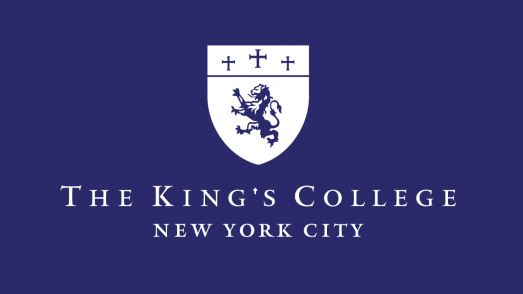How Science Points to a Creator: Dr. Michael Strauss at The King’s Forum
Particle physicist Dr. Michael Strauss discusses the compatibility of science and religion at The King's Forum in Dallas.

The King’s Forum, a series of discussions about theological, political, and academic topics inaugurated last autumn, launched its first event of the new year on February 24 in Dallas at the home of Dr. Brody and Julie Hildebrand. Dr. Todd von Helms, Senior Fellow at The King’s College, and Dr. Michael Strauss, a world-renowned particle physicist and professor at the University of Oklahoma, discussed the compatibility between science and religion.
Strauss’s lifelong interests in theology and outer space were cultivated by his family’s involvement in ministry—his father and grandfather were both pastors, and his brothers were involved in missions—as well as the testing of the Saturn V rocket in his childhood hometown of Huntsville, Ala. “I didn’t know where God was calling me” after college, Strauss said, but when his application to Dallas Theological Seminary was declined, he realized that God was opening the door for him to enter the scientific community. After completing his Ph.D. at UCLA, Strauss began teaching in 1995, and has since earned several awards for teaching as well as the opportunity to conduct research at CERN, the facility that houses the Large Hadron Collider near Geneva, Switzerland. While allowing him to participate in groundbreaking research, including the discovery of the Higgs Boson (also known as the “God Particle”), Strauss’s position in academia has given him a platform from which to engage both students and fellow scientists in conversation about the harmony of science and religion.
Strauss has discovered that both atheists and Christians, students and colleagues, often hold the opinion that religion is not worth discussing. He suggested that laymen and scientists might find more to talk about if they would explore the common ground of the intelligent design of the universe, which many scientists, theistic or not, agree on. Even secular scientists like Sir Fred Hoyle observed that the universe seems extraordinarily, improbably designed to support human life—and “If the universe is designed, maybe there really is a Designer,” Strauss said.
In his new book The Creator Revealed: A Physicist Examines the Big Bang and the Bible, Strauss asks, “What is the best objective evidence for the existence of God?” He revisited that question in the Forum, answering, “If you were God and you wanted to show your creation your power and your capability other than the Resurrection, creating a universe is a pretty good way to do it.” Just as Romans 1:20 assures Christians that creation bears witness to God’s identity, even skeptics and atheists can find evidence of an author through scientific observation.
Strauss likened scientific study to art critique. “When you look at a piece of art, you see the soul of the artist,” he said, quoting an artistic friend. “The art critic sees things in the painting that I would never see. As a scientist, I get to look at God’s painting, His creation, and I look at the intricacies with a trained eye and understand things about the soul of the artist that others might not see.”
Strauss suggested that by learning to use logical and scientifically-based arguments rather than dogma, “Christians could do a lot more to see how good science points to God.” Being articulate, observant, and truth-seeking is necessary to help Christians reconcile rather than exacerbate the rift between the two opposing camps of fact and faith—we ought to employ science, not deny it. Strauss added,
Augustine basically says that most people know something about how the universe works. They have a working knowledge of the plants and the animals, and when a believer comes to them and speaks nonsense about the things that they know are true, then how are they going to believe that believer when he speaks about things like eternal life and the resurrection of the dead? For too long, Christians in the name of science have been saying things that are nonsense that the scientists knows.
He continued, “People come to know Christ because someone has shown them the love of Christ. We need to be able to break down intellectual arguments, but you’re going to win more people by sharing Christ’s love than by arguing them into the kingdom” because Christianity is supported by subjective evidence as well as objective.
What can the layman do to find, research, and present such evidence? Be a truth-seeker first, Strauss said, because then we do not have to fear or deny our findings. He and von Helms encouraged the audience to seek different points of view by reading even authors who are antagonistic toward creation science. Von Helms noted, “For the sake of our witness for Jesus Christ, we must learn to stop living on the periphery of intellectual existence and cultural relevance.” Once Christians understand why they believe what they believe, they can engage the academic community in religious discourse—the main activity that occupies Strauss’s time when he is not smashing atoms together. “It’s a fun job,” Strauss said, referring to both his research and his discourse. “I find it a privilege that I am a scientist who has a walk with God, who believes in Christ, and can talk about the compatibility between science and Christianity.”




